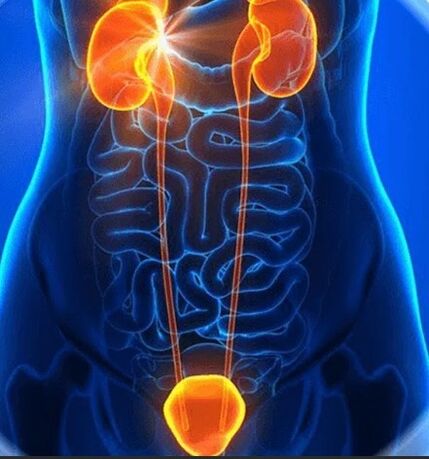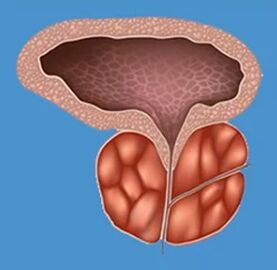Most of us are used to what we must carefully monitor the health of our hearts, we worry about the health of the lungs.But few men remember that they need special care for the "second Heart" - the prostate gland.
It is a small organ, the size of a nut.Not all men know where he is and what is intended.But it is often one of the most important reasons for the health problems of the male half of humanity.In addition, problems can exceed both a teenager and an elderly Aksakala.
Like any other disease, the inflammation of the prostate - the most common disease in the prostate gland - is easier to prevent than to treat and easier to treat at the beginning of the first stages.Therefore, it is extremely important that each man knows the symptoms of this disease, in order to be able to contact a urologist over time.

The prostate gland, or prostate, is a muscular built organ, which is an integral part of a man's sexual system.It is located in a small pool, under the bladder, weighs only 20 to 30 grams.The main function of the prostate, if we speak a simplified language, is to produce a liquid that is part of the sperm.
Despite its modest size (the size of a small chestnut), this small piece of iron can defeat any Hercules.
According to the World Health Organization, each third man among the inhabitants of Europe and the United States has at least noticed symptoms of inflammation of the prostatic gland.Each fifth man has chronic prostatitis.
The adenoming of prostate, which has signs similar to prostatitis, is detected in 10 to 15% of men over 50.The figures for the growing number of prostate diseases in young men, in particular chronic forms, as well as forms leading to infertility are particularly disturbed.
It is easy to acquire inflammation of the prostate, but it is treated for many years.
Urologists and Andrologists - doctors who treat prostatitis - often call this disease a "silent disease" because at first it may not declare its existence.When this disease is noticed, as a rule, we are already talking about complications of inflammation of the prostate gland.
Each patient is distinguished by his, a special course of the disease and the causes of his occurrence.
The causes of prostatitis
Prostatitis is the inflammation of the prostate gland.The main cause of the disease is the stagnation of blood in the basin.It can cause it to disorders of the gastrointestinal tract, which manifest themselves in the form of frequent constipation and intestinal disorders.Among other reasons:
- immune system violations;
- sexually transmissible, other infectious diseases;
- circulatory failure in the penis;
- irregular sex life;
- Neuroendocrine disorders in the body.
Prostatitis symptoms
The characteristic symptoms of the inflammation of the prostatic gland are the disorders of the urinary system.The reason is that with inflammation, the prostate increases in size and begins to tighten the urethra.In the absence of treatment, the inflammatory process causes sclerosis of the neck of the bladder, and in the case of a more serious development of the disease, the ureter can be completely blocked.
The second important characteristic is sexual function disorder.This manifests in the form of a weakening of an erection, the low severity of orgasm.Consequently, helplessness and infertility develop.
Other characteristic signs of prostatitis:
- burning sensation in the crotch and urethra (uretra);
- Unpleasant sensations in prostate and urine during stool (defecation);
- increase and increase in the intensity of urination;
- difficulty and intermittently of the urination;
- DRAWING THE PH of the urethra of the intestinal walls;
- The floating "sons" are perceptible in the urine;
- At night, long inexplicable erections are noted;
- acceleration of ejaculation during intercourse;
- Erased orgasm;
- increase in general fatigue;
- Depressed and anxious state, mental depression in anticipation of complications;
- Deterioration of an erection.

Not all listed symptoms are noted.Therefore, do not wait for the entire "bouquet" - as soon as you have noticed one or two of the symptoms described above - immediately go to a specialist.Do not consult friends, do not subscribe, because everyone has their own symptoms and their own sickness lessons.
Other signs may appear over time.Appear:
- Pain of a painful nature at the base of the root of the penis;
- pain in the scrotum region;
- Pain in the perineum.
Doctors include infertility, in which sperm are produced, but lose their mobility, among subsequent symptoms.
The strengthening of painful pain may indicate that the stones have formed in the gland of the prostate.Getting rid of them is much more difficult than kidney stones or even gallbladder.When detected, the doctor can only slow down his studies with the help of drugs in the future and increase existing.
Often, the urologist is already discussed at these steps when prostatitis also affects the work of other organs and systems.In this case, other specialists must be involved in treatment.
Who is likely to obtain a prostatitis?
Risk groups include men who:

- Lead a sedentary lifestyle;
- Representatives of professions where you have to sit for 8 hours or more immediately;
- who have chronic constipation;
- Transferred infectious diseases of the genito-the-first system;
- do not have a regular sex life;
- lead a random sex life;
- suffering from alcoholism.
Diagnosis of inflammation of the prostate gland
In order to precisely determine the disease stage and prescribe the appropriate treatment, diagnostics will be made, in particular:
- clinical examination;
- blood tests;
- urine analysis;
- Analysis of the secretion of the prostate gland;
- Ultrasound;
- Uroflowmetry.
What drugs are treated?
At the end of the diagnostic study, doctors generally prescribe a complex treatment, in particular:
- treatment of the immune system;
- The treatment of infections, if necessary, is detected, generally - using antibiotics;
- Antibacterial drugs for the treatment of precise prostate diseases.

For the treatment of prostatitis, various physiotherapeutic procedures are used, such as:
- massage;
- VCR therapy;
- laser treatment;
- reflexology;
- ultrasound;
- Hirudotherapy.
Prostatitic prevention and diagnosis
Each man under the age of 40 is simply forced to maintain his male health each year to suffer an exam with an urologist.After 40 years, it should be done once every six months.
Over time, not a hardened or advanced inflammation of the prostate gland cannot lead to a certain number of complications listed above, which can seriously complicate your life, and not only sexual.
The main preventive measure is, of course, the banal steering of a healthy lifestyle.And as the stagnation of blood in pelvic organs is one of the most common causes of the disease, it is necessary to compensate for the sedentary and inactive work using physical exercises and outdoor activities with all forces.
It is important to avoid hypothermia, as well as leading a regular sex life.






























